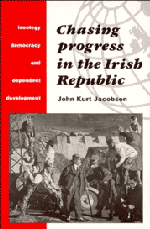Book contents
- Frontmatter
- Contents
- Acknowledgments
- Introduction
- 1 Reflex modernization: state, ideology and dependent development
- 2 Perils of planning: foreign capital, domestic policy, and the problem of state “strength”
- 3 The pale replica
- 4 The rising tide
- 5 Pushbuttons and pragmatists
- 6 Governability and corporatist compromise
- 7 Getting it right: debt, taxes, and industrial strategy, 1984–1990
- Afterword: 1991–1993
- Bibliography
- Index
7 - Getting it right: debt, taxes, and industrial strategy, 1984–1990
Published online by Cambridge University Press: 07 September 2010
- Frontmatter
- Contents
- Acknowledgments
- Introduction
- 1 Reflex modernization: state, ideology and dependent development
- 2 Perils of planning: foreign capital, domestic policy, and the problem of state “strength”
- 3 The pale replica
- 4 The rising tide
- 5 Pushbuttons and pragmatists
- 6 Governability and corporatist compromise
- 7 Getting it right: debt, taxes, and industrial strategy, 1984–1990
- Afterword: 1991–1993
- Bibliography
- Index
Summary
I couldn't believe it. “Oul wans” [elderly women] asking about borrowing requirements
a canvasser in 1982.People don't like what's happening but they are convinced that there is no alternative.
Dick Spring, Labour Party leader, 1988In the 1980s Irish governments imposed austerity with remarkable political case and in a uniform fashion that culminated in 1987 with Fine Gael's endorsement of the economic aims of the minority Fianna Fail government – virtually a declaration of “a national unity regime.” The debt crisis was understandably the first priority; it also obscured, if not eclipsed, debate over the shortcomings of development policy. This chapter explains how consent was gained for a particular diagnosis of crisis and for an extenuation of an ebbing developmental orthodoxy.
The next section surveys the economic difficulties and political liabilities of the industrial policy path which in effect was declared void but not nullified. For want of an authoritative successor this policy continued with minor modifications. Next I examine emergent alternatives within and outside the state's formal boundaries, which all met political and conceptual barriers during the administrations of a Fine Gael-Labour coalition, a minority Fianna Fail government, and since July 1989 a Fianna Fail–Progressive Democrat coalition. Fianna Fail would revive corporatist-style bargaining via a program for national recovery signed, sealed, and delivered in October 1987 despite the severe deflationary Budgets enacted at the time.
- Type
- Chapter
- Information
- Chasing Progress in the Irish RepublicIdeology, Democracy and Dependent Development, pp. 157 - 187Publisher: Cambridge University PressPrint publication year: 1994



